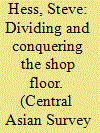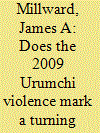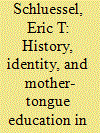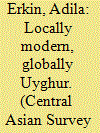|
|
|
Sort Order |
|
|
|
Items / Page
|
|
|
|
|
|
|
| Srl | Item |
| 1 |
ID:
103142


|
|
|
|
|
| Publication |
2009.
|
| Summary/Abstract |
This work examines the labour export programme of south-west Xinjiang that brought Uyghur migrant workers to the Early Light Toy Factory in Shaoguan, Guangdong and places it in the context of capitalist-working class divisions emerging in contemporary China, where clashes between managers and workers have become frequent occurrences, and increasing worker solidarity and growing labour activism have become a leading concern of the Communist Party of China and an increasingly influential business class. The author suggests that labour export is primarily utilized not as a means to alleviate poverty and reduce minority-Han income gaps, as claimed by official sources, but as an instrument of business-class interests for dividing and conquering the shop floor through the ethnic diversification of the workforce, an age-old tactic of factory bosses harkening back to the manipulation of foreign-born workers in late-nineteenth-century industrial America.
|
|
|
|
|
|
|
|
|
|
|
|
|
|
|
|
| 2 |
ID:
103139


|
|
|
|
|
| Publication |
2009.
|
| Summary/Abstract |
To provide background for the four papers on Xinjiang and the Uyghurs in this special issue, this introduction discusses developments in the region since 1991, then outlines the events of June and July 2009 in Shaoguan, Guangdong, and Urumchi, Xinjiang, as best can be pieced together from available information. It concludes with brief introductions to the four articles on Xinjiang that follow in this special issue.
|
|
|
|
|
|
|
|
|
|
|
|
|
|
|
|
| 3 |
ID:
103141


|
|
|
|
|
| Publication |
2009.
|
| Summary/Abstract |
An ethnic identity is not simply a catalyst for collective action; rather, it is an idea, a social variable shaped by its own intellectual history and by the historical consciousness of those who, wittingly or otherwise, engage with and articulate it. As one example, modern Uyghur identity, as it is most widely understood today, is the product, in part, of the action of a series of educational institutions operating in the years before 1949. Intellectuals and activists, beginning in the 1880s, formed networks of schools that provided an organizational basis for social and political movements, as well as a site for the negotiation of the ideas of those movements. Uyghur identity, along with a broader scheme of ethno-national classification, gained currency among a particular sector of Xinjiang society through participation in a set of broader organizations in the Sheng Shicai era. This history is reflected today in the actions and attitudes of contemporary Uyghur intellectuals, who react to encroachment on mother-tongue education with ideas and organizations informed by historical knowledge of this earlier period.
|
|
|
|
|
|
|
|
|
|
|
|
|
|
|
|
| 4 |
ID:
103140


|
|
|
|
|
| Publication |
2009.
|
| Summary/Abstract |
The generally accepted narrative for the birth of the modern Uyghur nation suggests that a national ideal for the Uyghur people and the use of the 'Uyghur' ethnonym in the modern context were creations of Soviet bureaucrats in the 1920s that were later promoted among Uyghurs in Xinjiang by Chinese authorities with Soviet sympathies. This article challenges this view by drawing on Uyghur language sources, which demonstrate the agency of Uyghur intellectuals in the creation of the concept of a modern Uyghur nation during the early twentieth century. In examining the activities of Uyghur intellectuals in fostering a modern Uyghur national identity, the article emphasizes the role of anti-colonial sentiments in this movement, thus linking the Uyghur example to post-colonial scholarly arguments about the development of modern national consciousness among formerly colonized peoples around the world.
|
|
|
|
|
|
|
|
|
|
|
|
|
|
|
|
| 5 |
ID:
103144


|
|
|
|
|
| Publication |
2009.
|
| Summary/Abstract |
Much scholarship and commentary has raised concerns about the fate of traditional Uyghur culture in the context of development and globalization in the twenty-first century, some even predicting its disappearance through assimilation to mainstream majority Han culture. However, by exploring the modern Uyghur culture of consumption - in foodstuffs, entertainment and real estate - this paper shows an opposite phenomenon: the transformation of the traditional Uyghur culture to a distinct cultural, religious and linguistic popular contemporary Uyghur culture that thrives and expands with the aid of globalization and development.
|
|
|
|
|
|
|
|
|
|
|
|
|
|
|
|
|
|
|
|
|